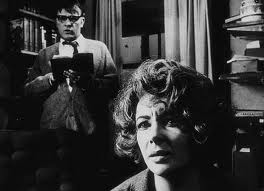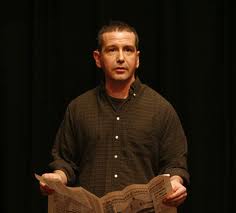Yes, I have three pieces in today’s Wall Street Journal! Starting this morning, my biweekly “Sightings” column about the arts in America will appear in the Leisure & Arts section of the Friday Journal (instead of the Saturday paper, which has just been extensively redesigned). In my first Friday column, I talk about…well, see for yourself. Here’s an excerpt.
* * *
Sometimes a passing comment can be more telling than a considered one. In reviewing the recent New York premiere of “Me, Myself & I,” Edward Albee’s latest play, I remarked that “Who’s Afraid of Virginia Woolf?” is “the only one of Mr. Albee’s 30 plays to have made an enduring impression on the general public–indeed, it’s possible that ‘Virginia Woolf’ could be the last American play of any kind to have made such an impression.” A number of readers wrote to me about that observation, and their reactions can be boiled down into a one-word reply: Really? So I gave it some additional thought, and the more I thought about it, the more certain I became that I’d inadvertently put my finger on something that is of relevance not just to Mr. Albee’s career, but to the increasingly shaky standing of high culture in postmodern America….
 Forty-eight years after the fact, it’s easy to forget that the controversy that greeted the premiere of “Virginia Woolf,” which in 1962 was thought by many Americans to be frank to the point of obscenity, made Edward Albee famous. How famous? Enough so that Johnny Carson invited him onto “The Tonight Show” four years later to promote his latest play, “A Delicate Balance.” (He shared the Carson couch with Duke Ellington.) Not long afterward, Life magazine published a lengthy, lavishly illustrated profile of Mr. Albee. In the ’60s, you couldn’t get much more famous than that….
Forty-eight years after the fact, it’s easy to forget that the controversy that greeted the premiere of “Virginia Woolf,” which in 1962 was thought by many Americans to be frank to the point of obscenity, made Edward Albee famous. How famous? Enough so that Johnny Carson invited him onto “The Tonight Show” four years later to promote his latest play, “A Delicate Balance.” (He shared the Carson couch with Duke Ellington.) Not long afterward, Life magazine published a lengthy, lavishly illustrated profile of Mr. Albee. In the ’60s, you couldn’t get much more famous than that….
Back then, the national media still devoted a considerable amount of time and space to covering high culture. Even if you didn’t live in New York, you could still read a review of an important play in a weekly newsmagazine, watch a scene being performed by the original cast on “The Ed Sullivan Show” or see the author being interviewed on “Tonight” or “Today.” Moreover, wire-service coverage of big-city cultural events was routinely carried by local newspapers throughout the country. As a result, it was possible well into the ’70s for a high-culture artist to become known to the public at large….
No more. The national media have mostly stopped covering high culture–nowadays they are besotted by Hollywood–meaning that it is no longer possible for an artist like Mr. Albee to win true fame….
* * *
Read the whole thing here.
TT: Almanac
“It is known to every newspaper publisher of the slightest professional intelligence; successful newspapers are ceaselessly querulous and bellicose. They never defend any one or any thing if they can help it; if the job is forced upon them, they tackle it by denouncing some one or something else. The plan never fails.”
H.L. Mencken, “The American Magazine”
TT: So you want to see a show?
Here’s my list of recommended Broadway, off-Broadway, and out-of-town shows, updated weekly. In all cases, I gave these shows favorable reviews (if sometimes qualifiedly so) in The Wall Street Journal when they opened. For more information, click on the title.
Warning: Broadway shows marked with an asterisk were sold out, or nearly so, last week.
BROADWAY:
• La Cage aux Folles (musical, PG-13, adult subject matter, reviewed here)
• Fela! (musical, PG-13, adult subject matter, closes Jan. 2, reviewed here)
• Million Dollar Quartet (jukebox musical, G, reviewed here)
OFF BROADWAY:
• Alfred Hitchcock’s The 39 Steps (comedy, G, suitable for bright children, original Broadway production reviewed here)
• Avenue Q (musical, R, adult subject matter and one show-stopping scene of puppet-on-puppet sex, reviewed here)
• The Fantasticks (musical, G, suitable for children capable of enjoying a love story, reviewed here)
• The Little Foxes (drama, G, unsuitable for children, brilliantly acted but tritely staged, closes Oct. 31, reviewed here)
IN ASHLAND, OREGON:
• Hamlet (Shakespeare, PG-13, closes Oct. 30, reviewed here)
• Ruined (drama, PG-13/R, violence and adult subject matter, closes Oct. 31, reviewed here)
• She Loves Me (musical, G, suitable for children capable of enjoying a love story, closes Oct. 30, reviewed here)
CLOSING SOON IN LOS ANGELES:
• The Glass Menagerie (drama, G, West Coast remounting of original New Haven/off-Broadway production, too dark for children, closes Oct. 17, off-Broadway run reviewed here)
• Ruined (drama, PG-13/R, West Coast remounting of original Chicago/off-Broadway production, violence and adult subject matter, closes Oct. 17, off-Broadway run reviewed here)
CLOSING SATURDAY IN SPRING GREEN, WISCONSIN:
• Major Barbara (serious comedy, G, too complicated for children, reviewed here)
TT: Almanac
“The newspaper is the natural enemy of the book, as the whore is of the decent woman.”
Edmond and Jules de Goncourt, journal entry, July 1858
PLENTY OF NOTHING
“Who deserves to be considered America’s most significant classical composer? Concertgoers of a certain age will doubtless choose Aaron Copland or George Gershwin, the creators of the first distinctively American-sounding styles of classical composition, while more contemporary listeners are more likely to cite Philip Glass or John Adams, who made minimalism the dominant classical-music idiom of the postwar era. But if ‘significant’ is taken to mean ‘influential,’ then a strong, if seemingly paradoxical, case can be made for a composer who, for all the undeniable influence he has exerted on American music, failed to write even one work that has made its way into the repertoires of any well-known orchestra, opera company, chamber group, singer, or instrumentalist…”
TT: Snapshot
Ginette Neveu plays the coda of Ernest Chausson’s Poème:
(This is the latest in a weekly series of arts-related videos that appear in this space each Wednesday.)
TT: Almanac
“It is uplifting to lose one’s faith in a reality which looks the way it is described in a newspaper.”
Karl Kraus, “In Praise of a Topsy-Turvy Lifestyle”
TT: Well spent
 I’ve had some sharp things to say in the past about the MacArthur Foundation’s “genius grants,” so I am entirely delighted to report that David Cromer, the greatest American stage director of his generation, and David Simon, the creator of Homicide, The Wire, and Treme, have both received MacArthur fellowships.
I’ve had some sharp things to say in the past about the MacArthur Foundation’s “genius grants,” so I am entirely delighted to report that David Cromer, the greatest American stage director of his generation, and David Simon, the creator of Homicide, The Wire, and Treme, have both received MacArthur fellowships.
I’m especially pleased about Cromer because of the role that my Wall Street Journal drama columns, in particular this 2008 piece, have played in bringing his work to the attention of a national audience. So far as I know, I’m the first person ever to have described him as a “genius” in print, in my review of his extraordinary production of Our Town. Of all the useful things that a critic can hope to do in the course of his career, few are more gratifying than ringing the bell of acclaim for an artist deserving of much wider recognition, then looking on from the sidelines as he receives it.
I am enormously proud of having written with enthusiasm in The Wall Street Journal about Diana Krall and Maria Schneider long before they became widely known. Now it is my privilege to add David Cromer to that list. I hope his name won’t be the last one on it.
